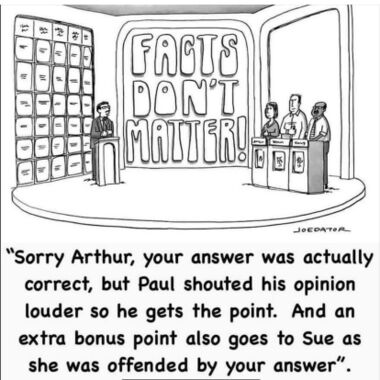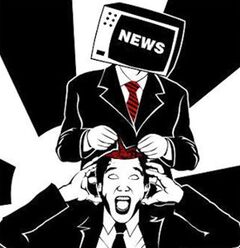Difference between revisions of "Post-truth"
m (Image) |
m (Text replacement - " -- " to " — ") |
||
| Line 43: | Line 43: | ||
{{FA|Corporate media}} | {{FA|Corporate media}} | ||
[[image:Corporate media.jpg|right|240px]] | [[image:Corporate media.jpg|right|240px]] | ||
| − | Corporate controlled media (whether [[social media|social]] or otherwise) is often criticised for acting as a medium of [[propaganda]]. More subtly, it also acts | + | Corporate controlled media (whether [[social media|social]] or otherwise) is often criticised for acting as a medium of [[propaganda]]. More subtly, it also acts — to the declining extent that it garners public attention — as a medium of setting the agenda.<ref>http://www.unwelcomeguests.net/750</ref> [[Craig Murray]] clarified in 2016 that the "[[Mainstream media]] is not post-truth. It never had any connection to the [[truth]]."<ref>https://www.craigmurray.org.uk/archives/2016/12/twitter-facebook-censorship-mainstream-media-denial/</ref> |
==Institute for Statecraft== | ==Institute for Statecraft== | ||
Latest revision as of 17:28, 1 February 2022
 | |
| Start | 2016 |
| Post-truth applies to statements, situations and arguments where facts are subordinated or subjected to obfuscation in pursuit of desired intepretations/outcomes. | |
"Post-Truth" describes the modern tenuous relationship to objective reality that many feel. The term emerged around 2016. 10 Days after
“Reality is under assault. Verbal confusion reigns. Truth and illusion have merged. Mental chaos makes it hard to fathom what is happening. We feel trapped in a hall of mirrors. Exposed lies are answered with other lies. The rational is countered with the irrational. Cognitive dissonance prevails. We endure a disquieting shame and even guilt. Tens of millions of Americans, especially women, undocumented workers, Muslims and African-Americans, suffer the acute anxiety of being pursued by a predator. All this is by design. Demagogues always infect the governed with their own psychosis.”
Chris Hedges (30 January 2017) [citation needed]
The term was added to the Oxford English dictionary in 2016. The entry is as follows:
Adjective
Relating to or denoting circumstances in which objective facts are less influential in shaping public opinion than appeals to emotion and personal belief:
- "in this era of post-truth politics, it's easy to cherry-pick data and come to whatever conclusion you desire"
- "some commentators have observed that we are living in a post-truth age" [1]
Corporate media
- Full article:
 Corporate media
Corporate media
- Full article:
Corporate controlled media (whether social or otherwise) is often criticised for acting as a medium of propaganda. More subtly, it also acts — to the declining extent that it garners public attention — as a medium of setting the agenda.[2] Craig Murray clarified in 2016 that the "Mainstream media is not post-truth. It never had any connection to the truth."[3]
Institute for Statecraft
- Full article:
 Institute for Statecraft
Institute for Statecraft
- Full article:
The Institute for Statecraft is a group suffering from permanent war mentality, with an extreme degree of focus on "Russian Propaganda". A Leaked document by Euan Grant documented his interest in “making use of fictional work for reinforcing messages about Russian hybrid warfare” [4]. The group has also defined "disinformation" to include only what the Kremlin does.
Related Quotation
| Page | Quote | Author | Date |
|---|---|---|---|
| Consensus trance | “Nine tenths of the news, as printed in the newspapers, is pseudo-news. Some days ten tenths. The ritual morning trance in which one scans columns of newsprint creates a peculiar form of generalised pseudo-attention to pseudo-reality... My own experience has been that renunciation of this self-hypnosis, of this particiption in this trance is not a sacrifice of reality.” | Thomas Merton | 1968 |
